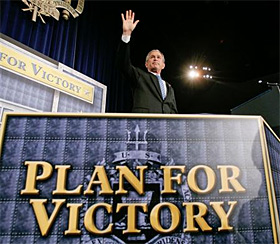 |
 |
 |
 News from Around the Americas | November 2005 News from Around the Americas | November 2005  
Bush Flags War Strategy
 Tabassum Zakaria - Reuters Tabassum Zakaria - Reuters


| | U.S. President George W. Bush waves to midshipmen after speaking about the war in Iraq at the U.S. Naval Academy in Annapolis, Maryland, November 30, 2005. (Reuters/Jason Reed) |
Annapolis, Maryland - U.S. troops will be able to withdraw from Iraq as local forces gain competence, U.S. President George W. Bush said on Wednesday, but near Baghdad the killing of nine people underscored a dire security situation two weeks before Iraq's milestone election.

In a speech at the U.S. Naval Academy in which he outlined his Iraq strategy, Bush said the U.S. goal is for Iraqis to take the lead in the fight against insurgents and to take responsibility without major foreign assistance.

"As Iraqi security forces stand up, coalition forces can stand down, and when our mission of defeating the terrorists in Iraq is complete, our troops will return home to a proud nation," Bush said.

On the ground in Iraq, a group of 10 masked men opened fire on a minibus near Baquba, north of Baghdad, killing nine Iraqis and wounding two, police said. It was the latest in a series of brazen gun attacks on travelers in the area.

The motive was not clear, but Baquba, a mixed Sunni and Shi'ite city and a base for former military officers, is on the front line of Iraq's growing sectarian conflict.

Bush has faced mounting criticism at home over his handling of the war, and rising calls for a troop pullout as the three-year anniversary of the invasion that toppled Saddam Hussein is approaching.

He vowed not to be held to a deadline and issued another call for patience. "It's worth the time and it's worth the effort," he said.

He is scheduled to make a series of speeches before Iraq's election on December 15 in an effort to show U.S. forces are on top and that victory is possible.

He has made several such speeches before, and the strategy outlined on Wednesday -- building up Iraq's political, security and economic institutions -- was based on what the White House said were broad goals that preceded the March 2003 invasion.

Security remains precarious in Iraq and U.S. military commanders have said they expect an increase in insurgent violence before the election, as was seen before an election last January.

In the past two weeks, more than 200 Iraqis, mostly civilians, have been killed in suicide attacks and car bombings, many targeting the Shi'ite Muslim majority in an apparent attempt to push the country closer to civil war.

There has also been a renewed series of kidnappings in the past three days, mostly targeting foreigners, reminiscent of the hostage-taking crisis last year, when around 200 foreigners were seized and many subsequently killed, some by beheading. Five foreign hostages have been snatched since Friday.

Sunni Arab guerrillas are waging an intensified campaign of violence in a bid to destabilize the Shi'ite- and Kurdish- dominated government, which is backed by Washington.

At the same time, Shi'ite militias linked to the government are being accused of arresting, torturing and killing Sunni Arabs in reprisal against the insurgency. The government has denied the existence of such "death squads."

"STRATEGY FOR VICTORY"

Bush's speech came a day after Iraq's national security adviser, who sits on a U.S.-Iraqi committee studying a framework for troop withdrawal, told Reuters that up to 30,000 U.S. troops could withdraw from Iraq early next year.

Bush has repeatedly linked a U.S. withdrawal to improvements in the capabilities of Iraqi forces. Washington currently has about 155,000 troops in the country, a number bolstered from 135,000 over the past several months to provide increased security ahead of the election.

More than 2,100 U.S. troops have died and 16,000 others have been wounded since U.S.-led forces invaded. There has also been little decline in the death rate, with this October being one of the deadliest months of the war.

Along with Bush's speech, the White House released a document summarizing U.S. policy called the "National Strategy for Victory in Iraq."

The White House offensive comes as one of its closest war allies -- Britain -- and two of the original Iraq war opponents -- Germany and Canada -- are under pressure at home following the kidnapping of some of their citizens in Iraq.

Two Canadians, a Briton and an American, all working for a Christian humanitarian aid group, were seized in Baghdad on Saturday. A video of them being held hostage by a group calling itself the "Swords of Truth" was shown on Arab TV on Tuesday.

The group accused the men of being "spies working for the occupying forces" under the guise of Christian aid.

A separate video was shown on German TV of a German archeologist and her driver who went missing in Iraq on Friday.

In that video, the group threatened to kill Susanne Osthoff and her driver unless Berlin stops all cooperation with the U.S.-backed Iraqi government. | 
 | |
 |



